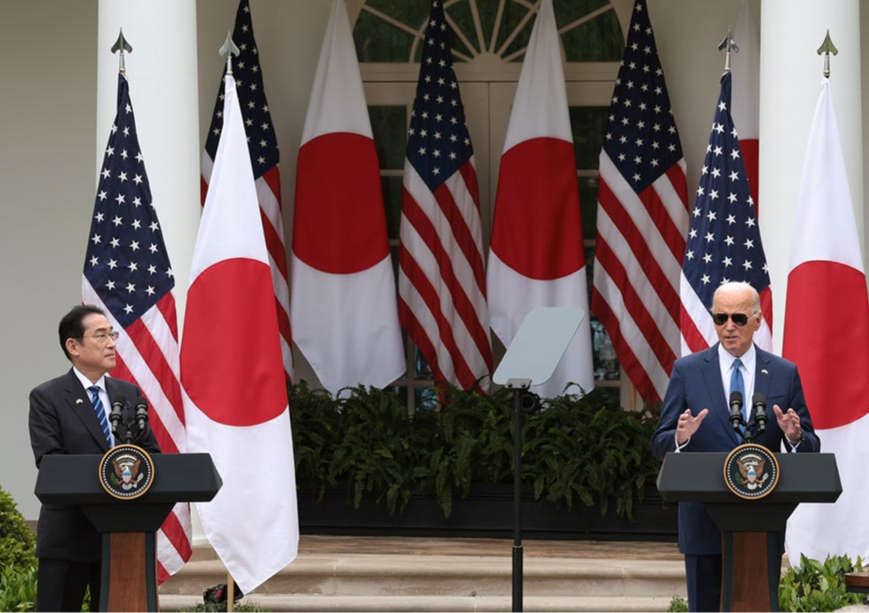-
CENTRES
Progammes & Centres
Location
For Japan, which is facing growing Chinese belligerence, combining capacities with the US with a new strategic intent may just be what it needs

The recent US-Japan summit, held against the backdrop of escalating regional tensions and shifting international dynamics, emerges as a pivotal moment in shaping the trajectory of bilateral relations and influencing broader geopolitical currents. The meeting between US President Joe Biden and Japanese Prime Minister Fumio Kishida in Washington comes against the backdrop of three volatile situations—a deepening Russia-China alliance, heightened aggression by China in the South China Sea and the Taiwan Strait, and a prolonged Russia-Ukraine war which has cast its shadow on US domestic politics.
During his state-level visit to the United States, Japanese Prime Minister Kishida reinforced the critical nature of the Japan-US Alliance amidst growing global challenges and a deteriorating security environment around Japan. In his address to the US Congress, the Prime Minister focused on a future vision for the international community, articulating the roles Japan and the US should play in realising this vision based on his diplomatic experiences. Despite uncertainties surrounding future US leadership, Kishida seeks to reaffirm the bipartisan support for the US-Japan alliance through trustworthy symbolism like the address to the US Congress. Japan aims to demonstrate its commitment to free trade and a rules-based economic order, positioning itself as a reliable partner regardless of political shifts.
Despite uncertainties surrounding future US leadership, Kishida seeks to reaffirm the bipartisan support for the US-Japan alliance through trustworthy symbolism like the address to the US Congress.
The US-Japan partnership is critical for both the countries bilaterally as well as for the Indo-Pacific region. The summit marks an affirmation of Japan's ascendance on the global stage, particularly at a time when the international community is grappling with complex challenges and the security environment around Japan is becoming increasingly challenging. It is also an acknowledgement of Japan's proactive stance in the Indo-Pacific, including defence reforms, increased defence spending, improved Japan-ROK relations, and support for Southeast Asia, the Pacific Islands, and Ukraine. As Kishida notes, Japan is now ready to act as America’s “global partner.” Announcements expected from the leaders include bolstered defence and security cooperation for better force integration, significant civil space cooperation initiatives, major research partnerships in emerging technologies, and commercial deals to strengthen economic ties and security.
From a strategic perspective, the summit allows Japan to solidify its alliance with the US, which is crucial for Japan's security and defence strategy. Japan's historic National Security Strategy, calling for increased defence spending and the acquisition of counterstrike capabilities, aligns with the US's strategic interests in the region. This alignment is crucial for Japan as it seeks to navigate the challenging security dynamics in the Indo-Pacific, particularly concerning the rise of China and the persistent threat from North Korea. The US Deputy Secretary of State Kurt Campbell previously suggested that the summit would propose collaborations on military and defence equipment development and potentially co-production. The stress on strategic collaboration was evident as one of the key highlights with President Joe Biden referring to the summit as the “most significant” upgrade to the bilateral alliance since it was established decades ago. Biden also indicated the possibility of Japan’s involvement in Pillar 2 of the AUKUS security framework. Economically, the summit presents opportunities for Japan to strengthen its economic ties with the US through various initiatives, including major research partnerships in outer space, cloud and AI infrastructure, and critical and emerging technologies. In the context of economic security in an increasingly competitive global landscape, the two countries announced a joint partnership to accelerate the development and commercialisation of nuclear fusion and infrastructure projects including a bullet train project that would use Japanese technology and investment.
The stress on strategic collaboration was evident as one of the key highlights with President Joe Biden referring to the summit as the “most significant” upgrade to the bilateral alliance since it was established decades ago.
Earlier, on 7 April, the US, the Philippines, Japan, and Australia made headlines with their inaugural joint naval manoeuvre in the South China Sea, aimed at signalling their unified stance on upholding international law in this vital and volatile maritime space. The summit's emphasis on regional stability, through the first-ever trilateral summit with the Philippines, underscores both the US and Japan's strategic aim to empower regional countries to defend their sovereign rights. This aligns with Japan's broader foreign policy goals and demonstrates its proactive stance in shaping regional dynamics. During the trilateral meeting, the three leaders launched the Luzon Economic Corridor as part of the first Partnership for Global Infrastructure and Investment corridor in the Indo-Pacific. The Luzon Corridor which was announced following the trilateral meeting between Japan, the Philippines and the US is the first Partnership for Global Infrastructure and Investment (PGII) corridor in the Indo-Pacific connecting Subic Bay, Clark, Manila, and Batangas in the Philippines.
For Biden, it is an opportune moment to reorient the US focus back to the Indo-Pacific, amidst growing belligerence from China in the region. At home, there is growing fatigue regarding America’s involvement in two ongoing wars—one in Ukraine and the other in the Middle East. In the ongoing election cycle in the US, this widespread discontent has translated into political intransigency, evident in the tussle in the US Congress over the approval of aid to Ukraine and Israel. Away from home in the Indo-Pacific too, sentiments may be gathering among regional countries that the US’ financial and strategic commitments to Ukraine and the Middle East have diverted Washington’s focus from the Indo-Pacific. As such, it is only logical that Biden wants to ensure a permanence in bilateral ties with Japan, its key partner in the Indo-Pacific region. In doing so, Biden and Kishida look to circumvent political and strategic impediments in the future. By upgrading an Eisenhower-era military alliance, Japan and the US are future-proofing bilateral ties from uncertainties that may ensure political changes in both countries, particularly a Trump administration in the US. By roping in the Philippines in a show of trilateral strength, Biden may be signalling that Japan-Philippines-US may be the most potent trinity in countering China in the South China Sea. For both Japan and the Philippines, which are facing growing Chinese belligerence, threat and bullying, combining capacities with the US with a new strategic intent may just be what they need.
By roping in the Philippines in a show of trilateral strength, Biden may be signalling that Japan-Philippines-US may be the most potent trinity in countering China in the South China Sea.
The US-Japan relations remain one of the strongest and most reliable, with hardly any Congressional opposition or issues. A strategic upgrade in military ties with Tokyo and providing assurance to Manila may both be good optics for Biden politically in an otherwise logjammed Congress and a perception that the Biden administration may be doing little to coerce Israel for a ceasefire in Gaza.
Pratnashree Basu is an Associate Fellow at the Observer Research Foundation
Vivek Mishra is a Fellow at the Observer Research Foundation
The views expressed above belong to the author(s). ORF research and analyses now available on Telegram! Click here to access our curated content — blogs, longforms and interviews.

Pratnashree Basu is an Associate Fellow, Indo-Pacific at Observer Research Foundation, Kolkata, with the Strategic Studies Programme and the Centre for New Economic Diplomacy. She ...
Read More +
Vivek Mishra is Deputy Director – Strategic Studies Programme at the Observer Research Foundation. His work focuses on US foreign policy, domestic politics in the US, ...
Read More +